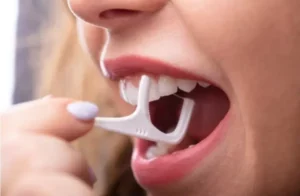When it comes to oral hygiene, brushing and flossing are two key practices that help keep your teeth and gums healthy. However, many people wonder whether dental floss contains fluoride and if it helps protect teeth from decay. Fluoride is known to strengthen teeth and prevent cavities, so it makes sense to ask if using floss with fluoride could give you an extra boost in maintaining your dental health.
In this article, we’ll explore the relationship between floss and fluoride. We’ll also cover important topics like what fluoride is, how it benefits your teeth, and whether using floss with fluoride offers any added protection. Let’s dive into the world of flossing and fluoride to help you make informed decisions about your oral care routine.
Does Any Dental Floss Contain Fluoride?
Yes, some dental flosses do contain fluoride, but it’s not very common. The vast majority of flosses are made from materials like nylon or PTFE (polytetrafluoroethylene) and are designed simply to remove plaque and food particles from between your teeth. Most traditional floss doesn’t include fluoride as an ingredient, but a few brands have started adding it to their products in recent years.

Fluoride-containing floss aims to give users the added benefit of fluoride protection while they clean between their teeth. This type of floss is marketed as being able to deliver fluoride to areas that are hard to reach with toothpaste and brushing alone. While fluoride in floss can be an additional tool in preventing cavities, it’s important to remember that flossing’s primary job is to remove debris and plaque buildup between teeth.
If you’re interested in trying fluoride floss, you can check the packaging or product description to see if fluoride is listed as an ingredient. However, even if your floss doesn’t contain fluoride, regular flossing combined with using fluoride toothpaste will still provide strong protection for your teeth.
What Is the Purpose of Fluoride?
Fluoride is a naturally occurring mineral that plays a crucial role in dental health. The main purpose of fluoride is to strengthen the enamel on your teeth, making them more resistant to acid attacks from plaque bacteria and sugars. Over time, these acid attacks can break down the tooth’s outer layer, leading to cavities.
Here are some key functions of fluoride when it comes to oral health:
- Strengthens Enamel: Fluoride helps to reinforce the outer surface of the teeth, making them stronger and less vulnerable to decay.
- Reverses Early Decay: Fluoride can actually help reverse early signs of tooth decay. If cavities are just beginning to form, fluoride can remineralize the enamel and prevent the need for more serious dental work.
- Fights Harmful Bacteria: Fluoride disrupts the process by which bacteria in your mouth produce acid. This reduces the overall amount of decay-causing acid in your mouth.
- Promotes Overall Oral Health: Regular exposure to fluoride can lower the risk of developing cavities, helping people maintain a healthier smile.
Fluoride is commonly found in many sources, including toothpaste, mouthwash, drinking water, and some types of floss. While it’s important to brush and floss regularly, using fluoride in toothpaste and mouthwash is particularly effective in protecting your teeth against decay.
What Part of Your Teeth Does Fluoride Help?
Fluoride mainly helps protect the enamel, which is the hard, outermost layer of your teeth. Enamel is your teeth’s first line of defense against decay, but it can weaken over time due to poor oral hygiene, frequent snacking on sugary foods, or acidic beverages. When this happens, the risk of cavities increases, and your teeth become more sensitive.

By strengthening the enamel, fluoride helps your teeth stay strong and resistant to decay. It also aids in the remineralization process, which is when minerals like calcium and phosphate are redeposited in your enamel after it’s been damaged by acids.
Fluoride can even reach beneath the surface of your teeth to repair areas where decay may be starting. That’s why regular exposure to fluoride is essential for preventing cavities and keeping your teeth strong throughout your life.
Is Fluoride Necessary for Good Oral Health?
Yes, fluoride is essential for maintaining good oral health. Most dental professionals agree that fluoride is one of the most effective ways to prevent cavities and strengthen teeth, especially in children. That’s why fluoride is a common ingredient in toothpaste and is added to the water supply in many areas around the world.
Without regular exposure to fluoride, your teeth may be more susceptible to decay and cavities, particularly in the areas that are harder to reach, like the spaces between your teeth. Even though flossing doesn’t always include fluoride, it helps keep these areas clean and free of debris, which is a crucial step in maintaining good oral hygiene.
If you’re concerned about getting enough fluoride, here are some ways to ensure you’re getting the proper amount:
- Use Fluoride Toothpaste: Most toothpaste brands include fluoride, which helps protect your teeth every time you brush.
- Drink Fluoridated Water: Many municipal water supplies include added fluoride to help reduce cavities in the general population.
- Try Fluoride Mouthwash: Some mouthwashes contain fluoride and can give your teeth an extra layer of protection.
- Consult Your Dentist: If you live in an area without fluoridated water or have special dental needs, your dentist can recommend fluoride treatments or supplements.
Does Flossing Help Protect Your Teeth Without Fluoride?
Even though most dental floss doesn’t contain fluoride, flossing is still incredibly important for protecting your teeth. Flossing removes food particles, plaque, and bacteria from between your teeth, where your toothbrush can’t reach. Without regular flossing, plaque can build up between your teeth and cause cavities, gum disease, and other oral health problems.
Flossing works alongside fluoride toothpaste and mouthwash to keep your teeth healthy. While fluoride helps to strengthen and protect your enamel, flossing ensures that you’re keeping your teeth and gums clean, reducing the risk of decay between your teeth.
Here’s why flossing is a key part of oral hygiene:
- Removes Plaque: Plaque is a sticky film of bacteria that forms on your teeth. If it isn’t removed by brushing and flossing, it can harden into tartar and lead to cavities and gum disease.
- Prevents Gum Disease: Flossing helps remove plaque from along the gumline, which is crucial for preventing gum disease (gingivitis and periodontitis).
- Reduces Cavities Between Teeth: Cavities are more likely to form in the tight spaces between your teeth, which is why flossing is so important. It clears away food and bacteria that could otherwise contribute to decay.
By making flossing a daily habit, you’re taking an important step in keeping your mouth healthy and cavity-free, even without fluoride in your floss.
Should You Use Fluoride Floss?
While flossing is crucial for maintaining good oral hygiene, fluoride floss isn’t a necessity for most people. Using fluoride toothpaste, mouthwash, and drinking fluoridated water usually provides enough fluoride to protect your teeth from decay. Regular flossing with any type of floss will still help you maintain good oral health by removing plaque and preventing cavities.

That said, if you’re looking for extra fluoride protection between your teeth, using fluoride floss could offer some benefits. It’s especially useful for people who are at a higher risk for cavities or who want to target hard-to-reach areas where plaque tends to build up.
Fluoride floss is not a replacement for brushing with fluoride toothpaste, but it can be an additional tool in your oral care routine. As with any oral hygiene product, it’s important to use fluoride floss consistently to see results.
The Best Ways to Use Fluoride for Dental Health
While flossing is a critical part of oral hygiene, fluoride toothpaste and mouthwash are the most effective ways to make sure your teeth are getting enough fluoride. Here’s how you can maximize fluoride’s benefits for your teeth:
1. Brush Twice a Day with Fluoride Toothpaste:
Brush your teeth at least twice a day using a fluoride toothpaste. Make sure to cover all surfaces of your teeth, including the front, back, and chewing surfaces. Don’t forget to brush your tongue and along the gumline.
2. Floss Daily:
Floss once a day to remove plaque and food particles from between your teeth. Even if your floss doesn’t contain fluoride, it’s still essential for keeping your mouth clean and healthy.
3. Rinse with Fluoride Mouthwash:
Use a fluoride mouthwash after brushing and flossing to help wash away bacteria and protect your teeth. This is especially useful for people at high risk of cavities or those with sensitive teeth.
4. Visit Your Dentist Regularly:
Regular dental checkups and cleanings are important for detecting early signs of decay and gum disease. Your dentist can also provide professional fluoride treatments if necessary.
Conclusion: Flossing and Fluoride Work Together for a Healthy Smile
To answer the question, most floss does not contain fluoride, but some specialty flosses do. Fluoride plays a vital role in strengthening and protecting your teeth from cavities, but regular flossing is just as important for keeping your mouth clean and preventing decay.
The best approach to oral care involves a combination of brushing with fluoride toothpaste, flossing daily, using fluoride mouthwash, and visiting your dentist regularly. Whether or not you use fluoride floss, these practices will help you maintain a healthy, cavity-free smile.


 Due to recent weather-related closures and delays, select Lane & Associates Family Dentistry offices will have adjusted hours this Friday, January 30th. Some locations will be closing at 2:00 PM, while others will remain open until 5:00 PM. Please contact your local Lane & Associates office to confirm hours and availability.
Due to recent weather-related closures and delays, select Lane & Associates Family Dentistry offices will have adjusted hours this Friday, January 30th. Some locations will be closing at 2:00 PM, while others will remain open until 5:00 PM. Please contact your local Lane & Associates office to confirm hours and availability.